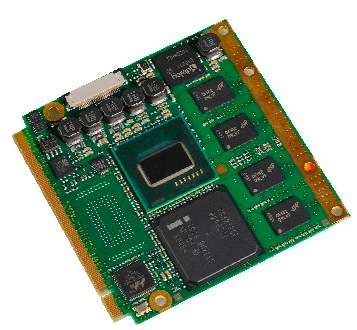Qseven module has Atom E6xx CPUs and optional SSD
Nov 11, 2010 — by LinuxDevices Staff — from the LinuxDevices Archive — 11 viewsMSC Vertriebs announced a Qseven module sporting three of Intel's recently announced Atom E6xx processors, plus up to 2GB of soldered-on DDR2 memory and an optional bootable, 4GB or 8GB SSD (solid state disk). The MSC Q7-TCTC-FD features operating ranges as wide as -40 to 185 deg. F, seven USB 2.0 ports, three PCI Express x1 lanes, CAN bus, plus LVDS and SDVO video outputs.
Intel announced its Atom E6xx in September, and there has already been a stream of embedded modules and boards based on the processors. None of the devices has exploited the E6xx's ability to work with third-party I/O controllers, likely because such devices are not yet available. Instead, all current devices employ Intel's own EG20T (block diagram, here).
Of the announced E6xx products, we're aware of three that have adopted the 2.75 x 2.75-inch (70 x 70mm) Qseven module format: Advantech's SOM-3564, Congatec's Conga-QA6 and Portwell's PQ7-M105IT. Once rare but obviously now becoming pretty common, Qseven modules have a 230-position "golden finger" connector originally designed for laptop graphics cards using Nvidia's MXM (Mobile PCI Express Module) format.

MSC Vertriebs' MSC Q7-TCTC-FD
As on the Portwell module, an operating range of up to 40 to 185 deg. F is claimed for the MSC Q7-TCTC-FD (above). The device is said to be offered with three E6xx versions: the 600MHz E620 (2.7-Watt TDP), the 1.3GHz E660T (3.3-Watt TDP), and the 1.6GHz E680T (3.3-Watt TDP).
According to MSC Vertriebs, the MSC Q7-TCTC-FD comes with 512MB of soldered-on DDR2 RAM in its most basic version, but the device may be ordered with 1GB or 2GB of memory on board as well. The module is additionally available with 4GB or 8GB of bootable flash storage, while a microSD slot is said to be a build option.
Like other Qseven modules, the MSC Q7-TCTC-FD passes all its signals to and from a baseboard via its "golden finger" connector. Expansion includes three PCI Express x1 lanes, SDVO, CAN, LPC, and I2C, while I/O includes gigabit Ethernet, seven USB 2.0 ports (six host, one client), LVDS and SDVO video, and high definition audio, the company says.
Mentioned on the MSC Q7-TCTC-FD's data sheet — but not detailed elsewhere as far as we could determine — is a carrier board known as the MSC Q7-MB-EP3-001. This device is said to have a real-world Ethernet connector, two SATA ports, Mini PCI Express and SD slots, and five USB ports (two of them external). Accepting input voltages from 10 to 28VDC, the carrier also includes a VGA port, a DB9 serial connector, and a touchscreen controller, MSC Vertriebs says.
Features and specifications listed by MSC Vertriebs for the MSC Q7-TCTC-FD include:
- Processor — 600MHz E620 (2.7-Watt TDP), 1.3GHz E660T (3.3-Watt TDP), or 1.6GHz E680T (3.3-Watt TDP).
- Chipset — EG20T
- Memory — 512MB, 1GB, or 2GB of soldered-on DDR2 RAM
- Storage — optional SSD with 4GB or 8GB of flash
- Expansion:
- 3 PCI Express x1 interfaces
- I2C
- CAN
- LPC
- SPI
- microSD slot (optional)
- Networking — gigabit Ethernet
- Other I/O:
- 7 x USB 2.0 (6 host, 1 device)
- 1 x LVDS (resolutions to 1280 x 768 pixels)
- 1 x SDVO (resolutions to 1920 x 1280)
- 1 x SATA
- HD audio
- Power — 5VDC input; 7 Watts typical
- Operating temperature — commercial version, 32 to 140 deg. F (0 to 60 deg. C); industrial version, -40 to 185 deg. F (-40 to 85 deg. C.)
- Dimensions — 2.75 x 2.75 inches (70 x 70mm)
Further information
MSC Vertriebs did not spell out pricing or availability for the MSC Q7-TCTC-FD, but says the device is designed to support operating systems including Linux and Windows XP Embedded. More information on the module may be found on the company's website, here.
This article was originally published on LinuxDevices.com and has been donated to the open source community by QuinStreet Inc. Please visit LinuxToday.com for up-to-date news and articles about Linux and open source.